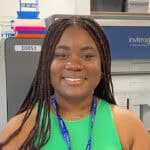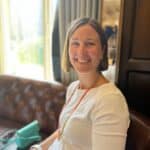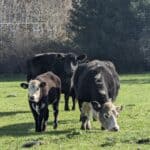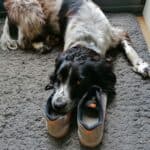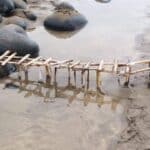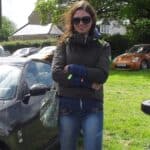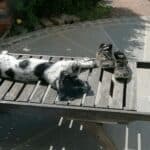Profile
Michelle Thom
-
About Me:
I live in the south of England, near Reading with my husband, daughter and son, cat, dog and fish. I’m a Research Scientist at an Institute that works on diseases that harm farm animals. I love my job but I also love running through the countryside with my dog!
-
Read more
I love exploring, and you can often find me out and about on trail runs with my dog (a crazy spaniel), we run in any weather and never complain about getting wet and muddy! I also like to keep fit by swimming, cycling and going to the gym. It all helps me de-stress from a hard day at work.
I have a real passion for cars, driving, going to car shows, and racing days – anything car-related really! I play the piano, love listening to music (often in my car!) and going to festivals. I also like art, mostly doing pencil drawings of animals.
I enjoy travelling, particularly if I can run, swim or look at cars while I’m there! As part of my job I have been lucky to visit lots of fabulous places in the UK and abroad.
One day I hope to go on a running holiday with my dog and a sketch pad!
-
My pronouns are:
she/her
-
My Work:
I’m a Research Scientist, which basically means I like to investigate things and solve problems. My work focuses on looking at ways to make farm animals better at protecting themselves against lots of nasty diseases, and sometimes this can cross over into helping humans as well. Some of the work that I do results in new vaccines to prevent diseases or new tests to help detect diseases.
-
Read more
To do my job I need to be able to understand how the small ‘immune’ cells in the body work together to protect against illness. Lots of pathogens (virus, bacteria) that cause diseases are very clever, and they know how to sneak past the body’s defence system so it’s my job to understand that as well. Then I find ways to make the body’s defence system work better.
My work covers diseases that affect livestock (farm animals like cows, chickens, pigs) but the diseases often affect other animals (wild animals like deer, badgers and even pets like cats, dogs, goats and horses). Some of the diseases of animals also cause similar disease in humans and so the human disease scientists and the animal disease scientists often team up to help each other solve the problem.
-
My Typical Day:
I like to start work early (before 7am) and grab a few quiet hours in the office to get a head-start on my projects before my colleagues arrive. A typically day would be split between the office (meetings, looking at data) and working in the lab (running experiments). I try to finish around 5pm. Go home, give my dog a cuddle, cook tea, catch up with my family. Sometimes I need to work on my computer in the evening.
-
Read more
As well as a Research Scientist, I am also a Project Manager and a Line Manager. This means that I spend a lot of time putting study plans together, looking at data, writing reports, preparing for meetings and deciding what to do next. It’s also my responsibility to make sure everyone in my team is happy and working to their best ability and that includes helping them progress in their careers. My passion is still the science and so I stay hands-on in the lab as much as I can, my workload is split roughly 60:40 desk to lab work.
I manage and plan my own projects which means I can usually plan my schedule in advance. Planning big experiments requires a lot of organisational skills including keeping track of budgets and ordering in supplies so we don’t run out. One of the great things about my job is that I get to work with lots of interesting people from diverse backgrounds, in different types of jobs, from all around the world. Although planning meetings in multiple time zones can be tricky!
I’m not good at taking lunch breaks and use this time to catch-up on emails but I try to work from home one day at week to have some quiet concentration time. Sometimes the lab work we do can mean very long hours but we try to balance this by taking time off when things are quieter.
Part of being a Research Scientist means that I spend a lot of my time reading, writing and reviewing papers. I’m very glad that I still get to break this up by stepping into the lab and doing some ‘real science’.
-
What I'd do with the prize money:
We already run a STEM programme with local schools in our area. I think it would be pretty cool to use this prize money as a prize in a STEM-based competition between the local schools.
-
Education:
I went to a regular comprehensive secondary school (11-16). I don’t remember having any particular interest in Science but I really wanted to be a Vet so I knew I needed science-based subjects. I did my A levels at college, didn’t get into Vet school but then decided to go to University to study something that would still allow me to help animals.
-
Qualifications:
For GCSEs, I studied two languages (French and German), Maths, English (Literature and Language), Geography, Science, Extended Science and Home Economics.
I went on to College to study A levels: Physics, Chemistry, Biology and AS Level Maths (Pure and Mechanics). In addition to A levels, I also studied Italian for Beginners and General Car Maintenance course as my extra-curricula modules.
At University I completed a 4-year undergraduate course: BSc (Hons) Applied Biological Sciences. This included a 12-month internship and a final year project. The title of the degree depended on the subjects that I picked in years 2 and 4. I kept mine quite broad (Virology, Microbiology, Immunology, Cell Biology, Genetics and Biochemistry) but I could have chosen different subjects and come away with a different degree title.
I got my MSc whilst working. It was a part-time research project related to my job, which I wrote up as a thesis followed by a viva examination. While I was still in the same job, I started a part-time PhD research project. Unfortunately, my job position was made redundant before I was able to finish. I’m currently looking at getting my PhD by submitting a portfolio of my published papers.
-
Work History:
During the school holidays, I always did lots of (un-paid) work experience in Veterinary practices and Farm parks – I tried to get as much experience as possible working with animals as I thought it would help if I wanted to become a Vet.
I also had a part-time paid job whilst I was at school, working evenings/weekends in a restaurant. I started in the kitchen (washing-up, preparing food), working up to waitress (when I turned 16).
I supported myself at University by working for Tesco as a shop assistant.
The 3rd year of my degree course included a 12-month internship, where I worked in the Research and Development department at Oxoid Ltd., Basingstoke. They make cell culture media products used by hospitals and microbiology labs. I was really lucky as this was both a paid job and I learnt so many practical lab skills that I wouldn’t have learnt in a normal undergraduate degree course. It definitely made me more employable after finishing my degree!
During my degree, I also had a part-time Research Technician job at The University of Bristol. The pay was not great, but again allowed me to build up my experience in the lab.
After University, I got my first full-time job working in animal healthcare. Even though I was a new graduate, I already had a good level of hands-on experience working in the lab and this enabled me to start at the level of Research Assistant. A few years later I was promoted to Research Scientist and now I work as a Senior Scientist and run my own small team.
-
Current Job:
I currently work as a senior level Research Scientist within the Immunogenetics Group where I line manage a small team (PostDoc Scientist, Research Technician and Student Intern) and run several projects (Bovine Tuberculosis and Foot-and-Mouth disease virus). The main focus of our work is to improve our understanding of health and disease in livestock (mostly cattle) in low and middle income countries (such as India and Africa). As we are an academic research institute, we run a student programme (undergraduates, masters and PhD) and another part of my role is to mentor and supervise students.
-
Employer:
-
My Interview
-
How would you describe yourself in 3 words?
Scientist fighting animal diseases
What did you want to be after you left school?
I wanted to be a Vet
Were you ever in trouble at school?
I was very good at not getting caught ;)
If you weren't doing this job, what would you choose instead?
Forensic Scientist (the really gruesome stuff) or an Archeologist
Who is your favourite singer or band?
I love music and it's too hard to choose!
What's your favourite food?
Sushi
If you had 3 wishes for yourself what would they be? - be honest!
1. to have more free time, 2. that I could teleport anywhere and take whoever I wanted with me, 3. that my brain could download instruction manuals in seconds that instantly made me an expert.
Tell us a joke.
Why do you always find something in the last place you look? Because after you have found it, there would be no point in continuing to look for it.
-



